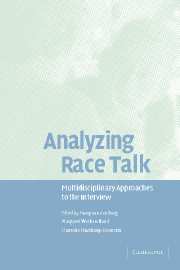Book contents
- Frontmatter
- Contents
- List of contributors
- Preface
- Acknowledgments
- Transcriptions symbols
- Introduction
- 1 Racism and the analysis of cultural resources in interviews
- 2 Analyzing racial discourse: the discursive psychology of mind–world relationships
- 3 Constructivist processes in discourse: a cognitive linguistics perspective
- 4 Institutional, professional, and lifeworld frames in interview talk
- 5 The uses of absurdity
- 6 Multiple voices in talking race: Pakeha reported speech in the discursive construction of the racial other
- 7 Contradictions in interview discourse
- 8 Racism, happiness, and ideology
- 9 The frame analysis of research interviews: social categorization and footing in interview discourse
- 10 Affiliation and detachment in interviewer answer receipts
- 11 Interviewer laughter as an unspecified request for clarification
- 12 Perspectives and frameworks in interviewers' queries
- Appendix: Interview transcripts
- Index
7 - Contradictions in interview discourse
Published online by Cambridge University Press: 22 September 2009
- Frontmatter
- Contents
- List of contributors
- Preface
- Acknowledgments
- Transcriptions symbols
- Introduction
- 1 Racism and the analysis of cultural resources in interviews
- 2 Analyzing racial discourse: the discursive psychology of mind–world relationships
- 3 Constructivist processes in discourse: a cognitive linguistics perspective
- 4 Institutional, professional, and lifeworld frames in interview talk
- 5 The uses of absurdity
- 6 Multiple voices in talking race: Pakeha reported speech in the discursive construction of the racial other
- 7 Contradictions in interview discourse
- 8 Racism, happiness, and ideology
- 9 The frame analysis of research interviews: social categorization and footing in interview discourse
- 10 Affiliation and detachment in interviewer answer receipts
- 11 Interviewer laughter as an unspecified request for clarification
- 12 Perspectives and frameworks in interviewers' queries
- Appendix: Interview transcripts
- Index
Summary
Variability in interview discourse: a problem or a source?
In the course of a research interview, and especially in an open interview, an interviewee may construct very different, and often irreconcilable, positions and lines of argument regarding a single topic. Such variety and contradiction can be explained by appealing to the notion that discourse is essentially incoherent. This explanation isn't a very attractive one, however. After all, abandoning the assumption of coherence implies abandoning the assumption of any rationality in social interaction, and ultimately giving up the goal of trying to understand discourse. The crucial question is therefore: How to approach and analyze the discursive variety and contradiction that occurs within an interview?
Variability as a problem
In mainstream research methodology, variability is approached as a problem. Differences, and especially contradictions, in interview discourse are viewed as indicators of some kind of “measurement error” due to biasing factors, such as the possible inadequacies of the interviewer's behavior. After “purifying” interview discourse as much as possible from such errors (for example, by correcting for the supposed effects of social desirability), several procedures are recommended to construct an estimation of the “real” opinion or attitude of the interviewee. In the attempt to measure attitudes (or, more precisely, to construct estimations of supposed attitudes), these procedures transform different or contradictory interviewee statements into a consistent position that can be recorded on an attitude scale.
- Type
- Chapter
- Information
- Analyzing Race TalkMultidisciplinary Perspectives on the Research Interview, pp. 119 - 137Publisher: Cambridge University PressPrint publication year: 2004
- 2
- Cited by



